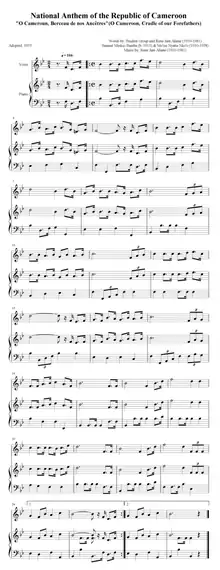O Cameroon, Cradle of Our Forefathers
"Chant de Ralliement" ("The Rallying Song"), also known as "Ô Cameroun berceau de nos ancêtres" ("O Cameroon, Cradle of our Forefathers") is the national anthem of Cameroon and former national anthem of French Cameroon.
 | |
National anthem of | |
| Also known as | Chant de Ralliement (English: The Rallying Song) |
|---|---|
| Lyrics | René Djam Afame / Samuel Minkio Bamba / Moїse Nyatte Nko'o, 1928 (French version) Bernard Nsokika Fonlon, 1961 (English version) |
| Music | René Djam Afame, 1928 |
| Adopted | 1957 (French version) 1978 (English version) |
History
The song was composed in 1928 by René Djam Afame, who also wrote the lyrics along with Samuel Minkio Bamba and Moïse Nyatte Nko'o, all while they were students at the École Normale of Foulassi.[1] It was used on an unofficial basis in French Cameroon beginning in 1948 before independence and officially adopted as the anthem of the territory in 1957. In 1960, the anthem was officially adopted by the new Republic of Cameroon.[2]
In 1961, upon the accession of the former British Southern Cameroons to the Republic of Cameroon, an English version was written by Bernard Nsokika Fonlon, which was later officially adopted in 1978.[3][2] In 1970, the French lyrics were changed to remove some words such as barbarie ("barbarianism") and sauvagerie ("savagery"), reference to France and the United Kingdom.[2]
Lyrics
Current lyrics (1970–present)
| French version[4] | English translation of French version | English version[3][4] |
|---|---|---|
I |
I |
I |
In local languages
The anthem has also been translated into several local languages.
| Ewondo lyrics |
|---|
I |
Former lyrics (1957–1970)
| French lyrics[4] | English translation |
|---|---|
I |
I |
References
- "René Jam Afane et Samuel Minkyo Bamba - Hymne national : Foulassi, berceau de nos ancêtres". www.nkul-beti-camer.com. Retrieved 2022-01-01.
- Mazou, Oumarou Mal (2015-05-07). "Le Cameroun, un pays à deux hymnes nationaux ? Quand traduire rime avec idéologie politique" (PDF). orbi.uliege.be. University of Liège. p. 2. Retrieved 2022-01-01.
- Lyonga, Nalova (2010). Socrates in Cameroon: The Life and Works of Bernard Nsokika Fonlon. African Books Collective. pp. 18–19. ISBN 978-9956-578-08-5.
- Onono, Côme Ndongo (2017). Paul Biya : pérégrinations glorieuses (in French). Editions Publibook. pp. 346–348. ISBN 978-2-342-15244-9.
- DeLancey, Mark W.; DeLancey, Mark D. (2000). Historical Dictionary of the Republic of Cameroon. Scarecrow Press. p. 62. ISBN 978-0-8108-3775-1.
- Abrioux, Ann; Chrétien, Pascale; Fayaud, Nathalie (March 2011). Le Monde en Français Student's Book (in French). Cambridge University Press. ISBN 978-0-9559265-9-4.
External links
- Cameroon: O Cameroon, Cradle of Our Forefathers - Audio of the national anthem of Cameroon, with information and lyrics (archive link)
- 'Chant de Ralliement'/'The Rallying Song' MIDI